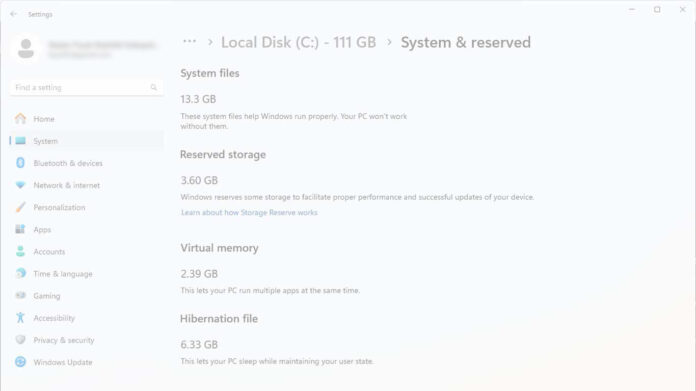In an ever-evolving world of technology, understanding how your operating system works is important. Reservation Storage is an often overlooked but very important feature in Windows 11, which ensures that system updates can be installed seamlessly, keeping your PC safe and up-to-date.
Reservation storage is a feature introduced by Microsoft starting from Windows 10 and continuing in Windows 11. This feature automatically allocates a portion of the hard disk storage space for use by the operating system, especially for system updates, applications, temporary system files, and cache.

The main purpose of reservation storage is to ensure that the Windows update process runs smoothly without being hindered by a shortage of disk space. With this allocated space, Windows can download and install important updates more efficiently, which in turn helps maintain system security and stability.
What is reservation storage?
Reservation storage is a feature of the Windows operating system designed to allocate a portion of dedicated disk space for system updates and applications. Its purpose is to ensure that important updates can be downloaded and installed without problems due to lack of disk space. This feature helps keep the system secure and up to date by minimizing the risk of update installation failing due to insufficient disk space.
The main purpose of storing reservations is to:
- Provides guaranteed disk space for system updates, thus reducing the chances of installation problems due to full disk space.
- Simplify the update process by providing space that has been allocated for update files.
- Improve system reliability and stability by ensuring that updates can be installed on time and without interruption.
How Reservation Storage Works in Windows 11
In Windows 11, the reservation store works by:
- Automatic Space Allocation: When Windows 11 is installed, the system automatically allocates a portion of the hard disk space as reserved storage. The size of this allocation varies depending on factors such as disk size and installed features.
- Space Usage: The allocated space is used to store temporary files needed during the update process, such as update installation files, cache, and temporary system files.
- Automatic Maintenance: Windows automatically manages the contents of the reserved store, ensuring that the space is not filled with unnecessary files and is always available for future updates.
Thus, reservation storage plays an important role in ensuring that the Windows 11 operating system can smoothly receive and install updates, which is very important for system security and performance. Users are advised to leave this feature on, although there is an option to adjust or disable it if needed.
How to check reservation storage
To check the storage size of a reservation in Windows 11, you can follow these steps:
- Press the Win+I keys to open Windows settings.
- Click on System in the left navigation pane.
- Scroll down and select Storage in the right pane.
- Then, scroll down and expand the Advanced storage settings option.
- Click the Storage used on other drives option from the menu that appears.
- Click your local C: drive.
- Select the System & reserved storage option under the Storage usage section.
- The amount of reserved storage appears. For example, laptops use 3.6 GB of drive space on our machines.

Turn Reservation Storage on or Off
Here is a step-by-step instruction to enable or disable reservation saving in Windows 11:
- Open Command Prompt as Administrator:
- Right-click on the Start button and select ‘Command Prompt (Admin)’ or ‘Windows PowerShell (Admin)’.
- Enter Command to Disable:
- To disable reservation saving, type the following command and press Enter:
dism /Online /Set-ReservedStorageState /State:Disabled
- You will see a confirmation message that the operation was successful.
- Enter Command to Activate:
- To re-enable reservation storage, use this command:
dism /Online /Set-ReservedStorageState /State:Enabled
- Make sure you get a message that the operation was successful.
- Restart your computer:
- After changing the reservation save state, restart your computer for the changes to take effect correctly.
Tips for Managing Reservation Storage:
- Check the storage size of the reservation periodically. Use Windows Settings to check how much space is allocated for reservation storage and adjust if necessary.
- Clean up temporary files. Use the ‘Storage Sense’ feature in Windows 11 to clean up unnecessary temporary files, which can help reduce the storage size of reservations.
- Consider Your Storage Needs. If you have limited disk space, consider turning off reservation storage. However, make sure you have enough space for system updates.
- Do not disable it unnecessarily. A reservation store exists to ensure smooth system updates. If you have enough disk space, it is better to leave it on.
- Use Third-Party Tools for Further Analysis. Consider using third-party tools for more in-depth storage analysis and to identify what files can be deleted or moved.
Pros and Cons of Disabling Reservation Storage
Pro:
- Disk Space Saving: Disabling reserved storage can free up significant disk space, which is beneficial for users with limited storage capacity1.
- Greater Control: Users have more control over their disk space usage without space automatically allocated for system updates.
Cons:
- Risk of Update Failing: Without reserved storage, there is a greater risk that system updates may fail due to lack of disk space.
- System Stability: Reservation storage helps maintain system stability by ensuring sufficient space for critical updates, which may be compromised if this feature is disabled.
Suggested use:
- When to Disable:
- If you have very limited disk space and need additional space for important files or applications.
- If you manually manage updates and are sure you can free up enough space before performing the update.
- When to let it on:
- If you have enough disk space and want to make sure that system updates run smoothly without manual intervention.
- If you are less concerned about the disk space used and prefer system reliability and stability.


